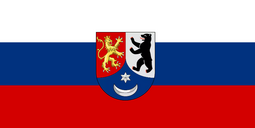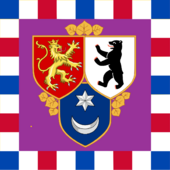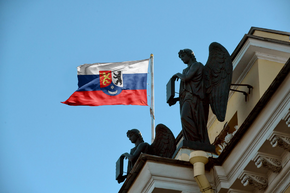Flag of Slovertia
Jump to navigation
Jump to search
 | |
| Use | National flag, civil and state ensign |
|---|---|
| Proportion | 1:2 |
| Adopted | 29 January 1989 |
| Design | A Horizontal triband of white, blue and red defaced with the lesser coat of arms of Slovertia. |
| Designed by | Jan Kúra |
The flag of Slovertia (Sloverti:Vlajka Slovertská) was adopted after the Sloverti Revolution as the flag of The Sloverti Republic. It uses the colours red white and blue and is defaced by the lesser coat of arms of Slovertia.
The Flag of the Sloverti Republic flying on top of Brativas Castle
Presidential standard
 | |
| Proportion | 1:1 |
|---|---|
| Adopted | 1989 |
| Design | Coat of Arms of Slovertia with border of Blue, White and Red. |
Another Sloverti official symbol is the Standard of the President of the Sloverti Republic. It was first introduced in 1948 for the first President of The First Sloverti Republic. The current version, was adopted upon the creation of an new democratic Sloverti Republic in 1989.
| Flag | Date | Use | Description |
|---|---|---|---|
| [[File:|100px]] | 1815-1940 | National Flag of the Kingdom of Slovertia | A horizontal tricolour of yellow (sometimes referred to as Gold), Navy blue and red |
| [[File:|100px]] | 1940-1942 | National flag of the First Sloverti Republic | The colours of the triband were changed to the republican white, blue and red symbolising the three traditional regions of Slovertia. \White for South Mazuria, Blue for Kojbakvy and red for Stredna. The triband was defaced by a yellow six pointed star but at times a version with the coat of arms of Slovertia similar to the modern day flag was used in tandem. |
| [[File:|100px]] | 1942-1989 | National flag of Technocratic Slovertia | Did away with nationalist symbols and replaced them with a blue flag defaced by a gold cog and three stars. The stars represent the three traditional Sloverti regions. |
